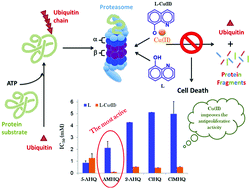当前位置:
X-MOL 学术
›
Metallomics
›
论文详情
Our official English website, www.x-mol.net, welcomes your feedback! (Note: you will need to create a separate account there.)
Amino- and chloro-8-hydroxyquinolines and their copper complexes as proteasome inhibitors and antiproliferative agents
Metallomics ( IF 3.4 ) Pub Date : 2017-09-11 00:00:00 , DOI: 10.1039/c7mt00156h Valentina Oliveri 1, 2, 3, 4, 5 , Valeria Lanza 5, 6, 7, 8, 9 , Danilo Milardi 5, 6, 7, 8, 9 , Maurizio Viale 5, 10, 11, 12, 13 , Irena Maric 5, 10, 11, 12, 13 , Carmelo Sgarlata 1, 2, 3, 4, 5 , Graziella Vecchio 1, 2, 3, 4, 5
Metallomics ( IF 3.4 ) Pub Date : 2017-09-11 00:00:00 , DOI: 10.1039/c7mt00156h Valentina Oliveri 1, 2, 3, 4, 5 , Valeria Lanza 5, 6, 7, 8, 9 , Danilo Milardi 5, 6, 7, 8, 9 , Maurizio Viale 5, 10, 11, 12, 13 , Irena Maric 5, 10, 11, 12, 13 , Carmelo Sgarlata 1, 2, 3, 4, 5 , Graziella Vecchio 1, 2, 3, 4, 5
Affiliation

|
Proliferation and programmed cell death are tightly correlated with the ubiquitin–proteasome system (UPS). Alterations in the UPS may be implicated in pathological conditions such as the proteasome over-activity in cancer cells. Mounting evidence indicates that many types of actively proliferating malignant cells are more sensitive to proteasome inhibition than normal cells, and therefore UPS inhibitors are actively pursued as anticancer agents. The approval of the proteasome inhibitor drug bortezomib for the treatment of myeloma and lymphoma further highlights the need for UPS inhibitors. Recent studies have suggested that clioquinol and 5-amino-8-hydroxyquinoline can inhibit proteasome activity and induce apoptosis in human cancer cells. As for clioquinol, a copper-dependent and -independent mechanism has been proposed to explain the inhibition of the proteasome whereas the activity of 5-amino-8-hydroxyquinoline has not been explored in the presence of copper(II) ions. Herein, we investigated the biological activity of some 8-hydroxyquinolines by using human ovarian (A2780) and lung (A549) cancer cells. The effect of copper(II) on the activity of these compounds was also evaluated. The investigated systems inhibit the chymotrypsin-like activity of the proteasome and induce growth inhibition and apoptosis in a concentration-dependent manner. Copper(II) ions increase the activity of 8-hydroxyquinoline derivatives except in the case of 5-amino-8-hydroxyquinoline. This study suggests the great potential of amino- and chloro-8-hydroxyquinolines as anticancer agents. Furthermore, it clarifies some aspects concerning the activity of 5-amino-8-hydroxyquinoline, which has been previously proposed as a proteasome inhibitor capable of overcoming resistance to bortezomib.
中文翻译:

氨基和氯8-羟基喹啉及其铜络合物作为蛋白酶体抑制剂和抗增殖剂
增殖和程序性细胞死亡与泛素-蛋白酶体系统(UPS)紧密相关。UPS的改变可能与病理状况有关,例如癌细胞中蛋白酶体过度活跃。越来越多的证据表明,许多类型的活跃增殖的恶性细胞比正常细胞对蛋白酶体的抑制更为敏感,因此,UPS抑制剂被积极地用作抗癌剂。蛋白酶体抑制剂药物硼替佐米用于治疗骨髓瘤和淋巴瘤的批准进一步凸显了对UPS抑制剂的需求。最近的研究表明,氯喹醇和5-氨基-8-羟基喹啉可以抑制蛋白酶体的活性并诱导人癌细胞的凋亡。至于氯喹醇,II)离子。本文中,我们通过使用人卵巢癌(A2780)和肺癌(A549)细胞研究了某些8-羟基喹啉的生物活性。还评估了铜(II)对这些化合物活性的影响。研究的系统抑制蛋白酶体的胰凝乳蛋白酶样活性,并以浓度依赖性方式诱导生长抑制和细胞凋亡。铜(II)离子会增加8-羟基喹啉衍生物的活性,但5-氨基-8-羟基喹啉除外。这项研究表明氨基和氯8-羟基喹啉作为抗癌剂的巨大潜力。此外,它阐明了有关5-氨基-8-羟基喹啉活性的一些方面,5-氨基-8-羟基喹啉先前已被提出为能够克服对硼替佐米的抗性的蛋白酶体抑制剂。
更新日期:2017-10-18
中文翻译:

氨基和氯8-羟基喹啉及其铜络合物作为蛋白酶体抑制剂和抗增殖剂
增殖和程序性细胞死亡与泛素-蛋白酶体系统(UPS)紧密相关。UPS的改变可能与病理状况有关,例如癌细胞中蛋白酶体过度活跃。越来越多的证据表明,许多类型的活跃增殖的恶性细胞比正常细胞对蛋白酶体的抑制更为敏感,因此,UPS抑制剂被积极地用作抗癌剂。蛋白酶体抑制剂药物硼替佐米用于治疗骨髓瘤和淋巴瘤的批准进一步凸显了对UPS抑制剂的需求。最近的研究表明,氯喹醇和5-氨基-8-羟基喹啉可以抑制蛋白酶体的活性并诱导人癌细胞的凋亡。至于氯喹醇,II)离子。本文中,我们通过使用人卵巢癌(A2780)和肺癌(A549)细胞研究了某些8-羟基喹啉的生物活性。还评估了铜(II)对这些化合物活性的影响。研究的系统抑制蛋白酶体的胰凝乳蛋白酶样活性,并以浓度依赖性方式诱导生长抑制和细胞凋亡。铜(II)离子会增加8-羟基喹啉衍生物的活性,但5-氨基-8-羟基喹啉除外。这项研究表明氨基和氯8-羟基喹啉作为抗癌剂的巨大潜力。此外,它阐明了有关5-氨基-8-羟基喹啉活性的一些方面,5-氨基-8-羟基喹啉先前已被提出为能够克服对硼替佐米的抗性的蛋白酶体抑制剂。



























 京公网安备 11010802027423号
京公网安备 11010802027423号